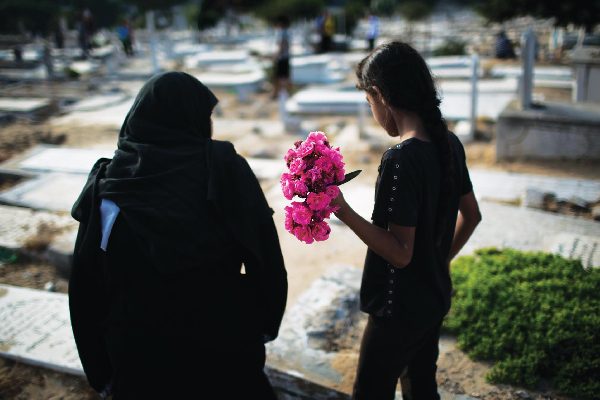
DEARBORN — Many Arab Americans want to be buried in their country of origin. However, high travel costs and burial complications often get in the way.
Several generations of Arabs in the United States have embraced and accepted their newly-found identities as they sought to become an integral part of American life and assimilate into western culture. Those Arab Americans, many of whom have never been to their homeland, wish to be united with their country of origin— even if it’s in death.
According to David Numan, an Islamic funeral director from Detroit, requesting burial in his homeland is “the highest bond you can imagine a person has with his country.”
Numan Funeral Home specializes in both local and overseas burials.
Numan said the process of shipping a deceased body to a foreign country is meticulous, involving a copious amount of paperwork to obtain proper travel permits, ensure health codes are followed and safe transportation of the deceased to the overseas destination for quick burial.
Overseas or local burial?
Arab Americans who feel a kinship with their homeland find the decision of where they wish to be buried complex, involving factors like family dynamics, religious guidelines and convenience.
Abdulrahman Alrifai, a Dearborn resident studying medicine in New York state, said that he wants to be buried in Syria. Alrifai said being buried in a country that observes Islamic traditions is important. He added that his family would be more likely to visit his grave on religious holidays.
While many Arab Americans prefer to be buried in their homeland, some do not care.
Summer Baraka, a local Palestinian American college student, said that although she wishes more American Palestinians would be buried in their homeland, she personally does not have a preference.
She added that if more Palestinian Americans were buried in their homeland, it would be an incentive for relatives to still feel a connection to the land, despite not being born and raised there.
“Whatever’s easiest for my kids,” said Ibrahim Abdullah, an Egyptian New York resident. “Burial is part of the grieving process,” he explained, saying he believes a decedent’s family should deal with the death as they see fit.
Funeral director Numan said that among Arab Americans, the Lebanese community most tends to bury their loved ones in the Middle East. He added that out of 120 bodies sent to the Middle East, the funeral home ships about 50 to Lebanon.
According to Numan, more Shi’a Pakistani, Iranian and Lebanese families are burying their loved ones in Al-Najaf, Iraq, the site of a significant Islamic battle and the largest cemetery in the world.
High costs
The high cost of an overseas burial is another hurdle preventing some families from carrying out a loved one’s wishes.
Abdullah, whose mother succumbed to gastric cancer in February, planned to carry out her wish to be buried in Egypt. However, he found the arrangements to be too expensive at the time.
“You can’t hop on a plane every time just to go visit,” said Taki Hassan, a sheikh at the Imam Ali Mosque in Toledo. The high cost of shipping remains overseas are not worth it, because proper Islamic burials are widely available in the U.S., he explained. He added that those with local family should be buried in their own communities, because prayer and paid respects are performed in the U.S. as often as they are overseas.
According to Numan, burying a loved one in Lebanon, for example, can cost $6,500. Accommodations can be made, however. If local burial is too expensive, the funeral home will offer its services free of charge, to discourage families from choosing cremation, which is non-Islamic.
Religious restrictions and accommodations
Islamic law guides believers along almost every aspect of the burial process, said Hassan of the Imam Ali Mosque. Those wishing to adhere to those religious laws might find it difficult to bury a body, whether locally or internationally.
Most airlines will not ship remains that have not been embalmed, a common procedure used to prevent decay, according to Kevin Stockham, a funeral director and embalmer in Kansas.
According to Hassan, Islamic law forbids embalming. He added that Islamically, a body is required to be buried unchanged, wrapped in a white cloth and without a casket.
Dearborn resident Wassim Awada said his family buried his uncle in Lebanon two weeks ago, because the local cemeteries would not allow him to be buried Islamically. He said the cemeteries required burial in a casket for sanitary and health reasons.
Hassan said many people believe this to be the case.
“Funeral homes say that because of business,” Hassan said, adding that a casket could cost from $1,000 to $10,000, which generates additional revenue. He said requiring a casket could be a cemetery’s policy, but there are no ordinances in the U.S. against burying a body without a casket.
When burying overseas
Those seeking to bury their loved ones back home should first notify the county’s Consulate office. One of the most important duties of the consulate, which can closely work with a funeral home, is to properly identify the remains and provide assistance to the deceased’s family or next of kin, according to the U.S. Bureau of Consular Affairs’ website. Proper care of the remains could be arranged with a funeral home.
From there, arrangements with the airlines are made to prepare the body for shipment. The remains are then shipped in an approved container. With the proper paperwork and added fees, the deceased can be buried in any country, even if it is not his or her homeland, according to Numan.
Hassan said that sometimes a shipment does not go as expected. There have been many incidents in which a body arrives at the airport in Beirut, kept without refrigeration, and is not delivered for burial for two days.






Leave a Reply